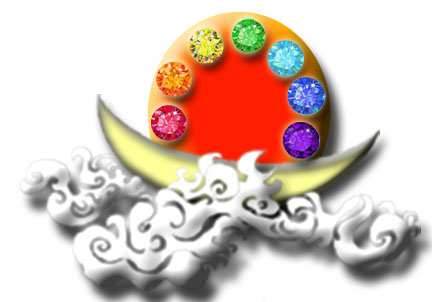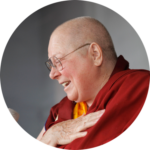
Many of the evil and erroneous views pertain to cultivation because there are many incorrect teachings on this matter. The most complete and helpful writing on this can be found in The Dharma of Cultivation Transmitted by H.H. Dorje Chang Buddha III, based on an oral discourse on the dharma given by H.H. Dorje Chang Buddha III to rinpoches and other disciples. I was present when that discourse was given. In fact, I was actually the rinpoche who requested the discourse so that we would have something that would be suitable for teaching Westerners. What happened was a very special transmission not only for Westerners and the most fortunate disciples who directly heard the discourse, but a transmission of dharma that was joyfully received by holy beings from other realms. Gadu Rinpoche wrote about his experience of this in the treasure book H.H. Dorje Chang Buddha III, and I reported my experience in another article as well. Colored lights flashed around the room while the dharma was being transmitted and continued to be seen for some time after that.
The Buddha Master has emphasized time and again that our cultivation must be based on bodhichitta and how we treat all other living beings and it cannot be put off to a future time when we have raised our families, made our fortune, or the like. The consistent theme of the many discourses and teachings that we have received is that it is a waste of time to just study Buddhism and practice dharma–even very high dharmas with initiations from authentic masters–if you do not improve your character and cultivate correctly. The book Learning From Buddha, goes into even more details on the need for both correct dharma practice and cultivation. Cultivation is our concrete practice–it is what we do every day and what we do to those around us, friend and enemy alike. It does not mean we all become monastics although that is the right path for some. We can certainly receive empowerments to cure our illnesses and help us on our path, but in the end our progress depends on our cultivation and how well we follow the precepts and teachings of the Buddhas. Several of the erroneous views relate to the relationship of cultivation and meditation or our dharma practice. This is detailed even more in The Supreme and Unsurpassable Mahamudra of Liberation (SAUMOL).
Evil View No. 16: Acknowledging verbal principles about emptiness yet deviating from true cultivation and consistent practice. This type of situation exists more in exoteric Buddhism. However, it also exists in esoteric Buddhism. Some currently well-known people in society especially like to expound the principles of emptiness. They talk about the Zen method of penetrating the truth. They explain that all phenomena are without self-nature and are originally empty, that one should generate a mind that is unattached to anything, that one’s mind should be empty and tranquil. They talk about the original nature that does not come or go. They talk about these principles in elaborate, high-flown terms that are mysterious and hard to understand. They especially like to talk about thePlatform Sutra, the Diamond Sutra, and prajna. They speak on and on about the principles of emptiness without ever mentioning real cultivation through concrete practice. They do not teach real cultivation. They do not tell living beings how to practice through concrete actions the path that leads to enlightenment. There are too many people like this. They very seriously violate the law of cause and effect. One may talk about the principles and truth of emptiness as contained in the Buddha-dharma. However, that is just theory and cannot solve the problem of ending the cycle of birth and death. That is why Sakyamuni Buddha told us how to cultivate ourselves. Only through cultivation and transforming cause and effect can one actually realize the states that those theories describe. Therefore, those who simply expound the principles of emptiness without speaking about real cultivation through concrete practice are evil people. This view is an evil view.
Evil View No. 29: Acknowledging that one may put off cultivating oneself until tomorrow. People often think, “I am tired today, so I will not do my dharma practice. I will do it tomorrow.” Or they say, “I will enjoy myself today. Tomorrow I will do my dharma practice. Tomorrow I will cultivate my mind and my actions.” As soon as such a thought arises in one’s mind, one has planted a karmic seed that leads to descent into samsara without being liberated. Bear in mind that this is the karmic seed leading to degeneration. Cultivation cannot be put off until tomorrow. To do so is to fall into this evil view.
Erroneous View No. 1: Acknowledging the Shifting the Mind Practice as a meditation practice. Even some greatly virtuous ones follow this view. I am referring to people of true great virtue. Some ancient virtuous ones also followed this view. They at least reflected this view in their speech karma, but did not reflect it in their actual conduct. Those with this view frequently use terms such as the meditation practice of bodhicitta, the meditation practice of the four limitless states of mind, and the meditation practice of the ten virtues. If at the very beginning one uses meditation to practice bodhicitta, the four limitless states of mind, or the ten virtues, that is a false practice. Meditation practice involves realizing the concept of emptiness, realizing that phenomena are devoid of characteristics or attributes, realizing non-attachment, cutting off deluded thoughts, and returning to one’s original mind. This is devoid of the real practice of compassion. Thus, no merit can be produced. How can one possibly practice bodhicitta like that? Therefore, when practicing the four limitless states of mind or bodhicitta, beginning practitioners should not rely upon meditation or contemplation. They should rely upon the practice of putting concepts into practice. They should transform their fixed concepts into actual deeds. They should focus their mind and transform that focused mind into action. They must put their concepts into practice, carry out the task of benefiting living beings, and implement those dharma matters that they contemplate. They should do so in a concrete manner through each word that they utter and each action that they take. This is what is meant by putting concepts into practice. Only when one is proficient in putting concepts into practice can one turn to meditation practice to cultivate the state of not being attached to anything. From meditation one will enter the practice of concentration. From there one can penetrate deeply into the reality that emptiness and existence are not different and can eventually realize the state of applying usages that arise from Buddha-nature.
Erroneous View No. 2: Acknowledging sitting meditation as cultivating oneself. Some people say that they are cultivating themselves when they sit in meditation. Sitting meditation is not cultivation. It is just sitting meditation. Sitting meditation is for directly experiencing what one’s original nature is. Through direct observation, one comes to understand one’s mind and see one’s original nature. However, this goal may not always be achieved. Some people use sitting meditation with the goal of directly experiencing the ultimate truth of dharma principles but may not be able to do so. Cultivating oneself is a completely different matter. Sitting meditation is less than one-tenth of cultivation. Meditation is just one of the six paramitas, having nothing to do with the other five. In cultivating oneself, one must face living beings in real life, face one’s own mind, and act as the Buddha acted.
Erroneous View No. 4: Acknowledging that doing a dharma practice is cultivating oneself. The view that doing a dharma practice is cultivation is an erroneous view. Doing your dharma practice is doing your dharma practice. It is not cultivating yourself. Cultivation entails carrying out bodhicitta of great compassion, abiding by the precepts, and other things.
Erroneous View No. 5: Acknowledging that studying the teachings of the sutras is learning from Buddha. Some people spend all of their time studying the teachings of the sutras. They can recite the sutras fluently from memory. They call themselves Buddhist cultivators. That is incorrect. They are scholars of Buddhism engaged in Buddhist studies. They are not cultivators. We should not approve of this erroneous view. Approving means that you yourself have this erroneous view or that you approve of others having this erroneous view. Either way reflects an erroneous view.
Erroneous View No. 9. Acknowledging that one’s illness can be cured by requesting empowerment but without cultivating oneself. Those with this view think that without cultivating themselves their illness will still be cured just by requesting and relying upon empowerment from the Buddhas and Bodhisattvas or their master. Such thinking is incorrect. One must cultivate oneself. One should cultivate oneself, request empowerment, and take medicine. By doing all these, one’s illness can be cured.
Erroneous View No. 33: Acknowledging that as long as one has dharma, one will attain realization powers. Those with this view think that as long as they learn Buddha-dharma, they will definitely generate realization powers. That is impossible. One must rely upon cultivation to generate realization powers. Of course, it would be best to rely upon The Supreme and Unsurpassable Mahamudra of Liberation. That is the best Buddha-dharma. At the time of receiving a “state practice” inner-tantric initiation in the holy sense, one can give rise to a true intent, start the true practice, and enter the true dharma. Thus, one can combine one’s intent, practice, and the power of one’s vows together with the holy dharma. That is the only dharma through which one can realize holy realization powers on the spot. However, to receive the “state practice” initiation, one must first learn well and practice the preliminary practices and main practices ofThe Mahamudra of Liberation, which is an absolutely indispensable source to the path.
Erroneous View No. 47: Acknowledging that one who has not received an initiation cannot attain accomplishment through learning dharma and cultivation. A person with this view thinks that because he never received an initiation, he will definitely not become accomplished in the dharma even though he learns dharma and cultivates himself. This is a misunderstanding. Even though you have not received an initiation, you can still attain accomplishment and liberation as long as you take refuge, learn true Buddha-dharma, and cultivate yourself in accordance with the dharma. It can only be said that it would be best if you had the guidance of a good master. That will make it less likely for you to fall into evil and erroneous views. However, an initiation is not absolutely required. Cultivation and learning dharma are what is important. Learning dharma and cultivating yourself is the key. Receiving an initiation is not necessarily most important. Of course, some dharmas can only be transmitted through an initiation, especially the “state practice” dharma. If you do not receive an initiation, this does not necessarily mean that you cannot become accomplished. As long as you cultivate yourself according to the dharma, you can become accomplished. The Supreme and Unsurpassable Mahamudra of Liberation is the best dharma and cultivation method.
Erroneous View No. 89: Acknowledging that cultivating oneself and learning from Buddha must require giving up work. Some people say that they will simply give up their work in order to cultivate themselves and learn Buddhism. They say that only by quitting their job can they concentrate their attention on cultivation and thereby cultivate themselves well. This is an erroneous view. A true cultivator acts in accord with the teachings of Buddhism no matter what circumstances he is in. One should not think that only by quitting one’s job and focusing entirely on cultivation is one acting in accord with the teachings of Buddhism.
See also articles on Evil View #4, Evil View #9, and Erroneous View #16.





Add comment